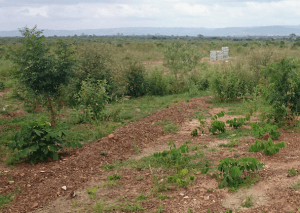Land grabbing for biofuels hits Ghana, other African countries – Report
 There appears to be a gradual but ominous attempt to turn Africa into the production centre of some selected food crops and non-food crops for the production of biofuels to feed industry and vehicles in Europe.
There appears to be a gradual but ominous attempt to turn Africa into the production centre of some selected food crops and non-food crops for the production of biofuels to feed industry and vehicles in Europe.
A recent detailed report by the environmental group, Friends of the Earth International shows that large tracts of land are being acquired in some African countries including Ghana, by local and multinational companies to produce crops for biofuel for export to Europe.
According to the report, a third of the land sold or acquired in Africa, some five million hectares is intended for fuel crops.
The report profiles land-grab cases that have happened in 11 African countries, most of which is being used or intended to be used to grow biofuel crops like Jatropha and palm oil.
The report cited A UN FAO study in 2009 that looked at land allocations in five sub-Saharan countries: Ethiopia, Ghana, Madagascar, Mali and Sudan.
The report it said found documented evidence that 2.4 million hectares of land had been transferred in land deals (of more than 1,000 ha) since 2004. This land was destined for food and fuel production, with considerable areas designated for fuel crops in Ethiopia, Madagascar and Ghana.
A separate report it cited indicated that A separate study by the International Food Policy Research Institute estimated that 20 million hectares of land have been sold since 2006 in land deals, with 9 million hectares acquired in Africa.
Of this, almost five million hectares – an area bigger than the Netherlands – are reportedly intended for agrofuel, including Jatropha, oil palm and sweet sorghum, the report said.
According to the report, the sudden interest in land appears to be driven by a combination of factors, but concerns about food security and fuel supplies dominate.
The sharp rise in food prices in 2007 and 2008 and the volatile oil price appear to have led a number of countries to question the security of supply, with fears exacerbated by expectations of how climate change will affect agriculture in years to come, it added.
The report indicated further that concerns about energy supply appear to be a key driver behind the demand for agrofuel crops – with the EU aiming for 10% of transport fuel to come from “renewable” sources by 2010. These EU targets have established a clear market – which given land prices and the lack of available land within the EU will inevitably be met by imports.
In Ghana there are companies from Brazil, Italy, Norway, Israel, China, Germany, The Netherlands, Belgium and India that are cultivating fields in the Volta, Brong Ahafo, Ashanti, Eastern and the Northern regions of Ghana. The main non-food crop that these companies are planting is Jatropha to be processed into biofuel for export.
One of the companies, Agroils of Italy is cultivating Jatropha on 10,000 hectares of land in Yeji in the Brong Ahafo region of Ghana for biofuels.
Israeli company, Galten has acquired 100,000 hectares of land and an Indian company had requested for 50,000 hectares of land from the Ghana Investment Promotion Council (GIPC), to cultivate Jatropha.
A company from the Netherlands has started a pilot project on 10 acres in the northern region and the Chinese are also doing a pilot project.
Gold Star Farms Ltd. Says it has available five million acres of land to plant Jatropha for the production of biofuels for export.
A Norwegian company ScanFuel Ltd., has started operations in the Asante Akim North District in the Ashanti region to produce biofuel. The company aims to start initial cultivation of Jatropha seeds on 10,000 hectares of land.
The company which has a Ghanaian subsidiary, ScanFuel Ghana Ltd., says its Ghanaian unit has contracted about 400,000 hectares of land, with up to 60% reserved for biofuel production, “not less” than 30% for food production and the remainder for biodiversity buffer zones.
Another Norwegian company, Biofuels Africa Ltd., the only one among the about 20 biofuels companies cultivating Jatropha which says it has received an Environmental Impact Assessment (EIA) permit from Ghana’s Environmental Protection Agency (EPA) which covers 23,762.45 hectares of its project area is operating in two locations.
Steinar Kolnes, CEO, Co-founder and director of BioFuel Africa Limited has told ghanabusinessnews.com by email that the company is operating in two locations in Ghana. The company has a 300 hectare test farm in Sogakope in the Volta region and a 10,696.32 hectares in Yendi in the Northern region. He said the company has planted a total of 660 hectares of Jatropha.
By Emmanuel K. Dogbevi
